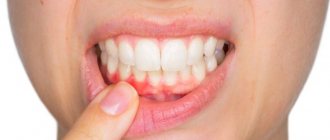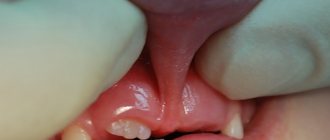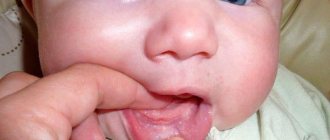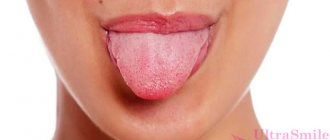Why do children and adults bite their tongues in their sleep?
An active lifestyle, dynamic games (in children) are the main causes of an unpleasant and often painful sensation on the tongue after sleep.
Active play with peers can lead to a child falling. At the same time, the teeth close and the tongue is bitten. Boys fight often. During a fight, they can hit each other in the jaw, which causes tongue biting.
Adults bite their tongues for almost the same reasons. They lead an active lifestyle, work out in the gym, during which mechanical impact occurs on the jaw.
Tongue biting during sleep is a common disease that affects both children and adults. There are many factors that provoke this phenomenon: stress, vitamin deficiency, dental problem, habit. We will talk in more detail about the causes of tongue bite during sleep.
Diagnostics
Neurologists diagnose and treat epilepsy. Some of them specifically expand their qualifications in this area, which allows them to act even more effectively.
Examination of a patient with suspected epilepsy includes the following methods:
- collection of complaints and medical history: the doctor asks the patient in detail about the symptoms that bother him, finds out the time and circumstances of their occurrence; a characteristic sign of epilepsy is the appearance of seizures against the background of sharp sounds, bright or flashing lights, etc.; special attention is paid to heredity, past injuries and diseases, the patient’s lifestyle and bad habits;
- neurological examination: the doctor evaluates muscle strength, skin sensitivity, severity and symmetrical reflexes;
- EEG (electroencephalography): a procedure for recording the electrical activity of the brain, allowing one to see the characteristic activity of an epileptogenic focus; if necessary, the doctor may try to provoke overexcitation using flashes of light or rhythmic sounds;
- MRI of the brain: makes it possible to identify pathological areas and formations: tumors, fissures, ischemic areas, consequences of a stroke, etc.;
- angiography of the vessels of the head: injection of a contrast agent into the blood followed by radiography; allows you to see areas of vasoconstriction and deterioration of blood flow;
- Ultrasound of the brain (Echo-encephalogram): used in children of the first year of life whose fontanel has not yet closed; visualizes tumors and other space-occupying formations, fluid accumulation, etc.;
- rheoencephalography: measurement of electrical resistance of head tissue, which can be used to diagnose blood flow disorders;
- general examinations: general blood and urine tests, blood biochemistry, tests for infections, ECG, etc. for a comprehensive assessment of the patient’s condition;
- consultations with specialized specialists: neurosurgeon, toxicologist, narcologist, psychiatrist, etc. (prescribed depending on the suspected cause of the attacks).
The list of studies may vary depending on the patient’s age, type of attack, presence of chronic pathologies and other factors.
Why is this dangerous?
If a person says: “I bite my tongue in my sleep,” then you need to know about the dangers of such a phenomenon. Firstly, when biting, the lateral parts of the tongue are damaged. Most often, the mucous membranes of the cheeks are affected during a bite. If the phenomenon occurs frequently, chronic damage to the inner surface of the cheeks occurs.
Secondly, bleeding of the tongue, pain, wounds, ulcers are the results of biting the tongue. These effects can make it difficult to chew food particles and make individual sounds. In particular, during a conversation there may be a “whistle” of sounds in people who suffer from this disease.
Of course, it is impossible to die from biting your own tongue. Even if you bite your tongue completely off.
What is the danger
When a person bites his tongue in a dream, he runs the risk of injury and infectious diseases of the oral cavity. Repeated attacks worsen the condition of the wound, making it vulnerable to developing:
- tuberculous ulcer;
- leukoplakia;
- cancer caused by lack of treatment.
Often the sleeper bites his tongue on only one side. Strong sharp clenching of the teeth leads to the opening of bleeding. Damage causes unbearable pain. Lack of timely treatment of the wound contributes to its infection, swelling and abscess occur.
If you bite your cheek hard and do not provide help, the patient increases the risk of chronic stomatitis and soft tissue necrosis.
In persistent cases in the absence of dental problems, doctors tend to diagnose the first signs of epilepsy. You need to worry when the condition persists for more than a month and interferes with a normal lifestyle.
Reasons for biting your tongue in your sleep
There are a huge number of factors that interrupt restful sleep. One of the common causes is biting the tongue, and with it the cheeks. There is no need to sound the alarm if a similar situation occurs every few months. However, if a person feels pain in the tongue area every morning, then it is urgently necessary to determine the cause of this phenomenon:
1. Bruxism is a disease in which a person grinds his teeth at night. This is not a serious pathology, but as a result, the tongue and the inside of the cheeks are bitten. Many doctors are of the opinion that bruxism at night is a neurological problem. Therefore, in many cases, it is enough to put on a silicone mouthguard before bed to get rid of an uncontrollable bad habit.
2. Unadjusted braces and incorrectly installed braces can cause the tongue to touch the teeth. In order to avoid biting your tongue while sleeping, you need to wear a special elastic band that slightly raises your jaw.
3. Apnea is a pathological condition in which breathing is briefly interrupted during sleep. Apnea in adults is quite common. During this “seizure,” the jaw relaxes as much as possible, and the tongue slips outside the dentition. As soon as breathing is restored, the jaw clenches.
4. Stress and nightmares are one of the common reasons for biting your tongue in your sleep. Most often, pregnant women or those who have recently given birth to a baby suffer from this problem. Their body is still under stress and undergoing dramatic hormonal changes.
5. Lyme disease is one of the rarest causes of tongue biting during sleep. This pathology affects the brain and nervous system. As a result, the body sends incorrect signals to the muscles.
6. Convulsions are one of the reasons for biting the inner lining of the oral cavity. Most often, this problem affects people who have epilepsy attacks. During sleep, the epileptic's muscles are uncontrollable, which can cause involuntary closure of the jaw. Cramps during sleep can also appear in children during the period of their active growth. A somnologist can diagnose the problem. Thanks to a special examination method, the doctor observes the patient's brain waves. If the doctor confirms that the cause of tongue biting is not epilepsy, other causes should be considered.
7. Epilepsy is a chronic disease that causes seizures, loss of consciousness, vomiting and other dangerous symptoms. Attacks most often occur during sleep. Epilepsy during sleep differs from the usual clinical picture. Breathing worsens, muscle hypertonicity occurs spontaneously. The upper limbs of a person are in an abducted state, and the lower ones are extended. During spasm, involuntary bowel movements and urine leakage are observed. The epileptic clenches his jaw tightly and bites the tip of his tongue. Most often this leads to bleeding. These convulsions last about a minute. After the attack, breathing returns to normal, and foam appears near the mouth. After biting the tongue, it has a scarlet color. After a seizure at night, patients may not remember what happened to them. However, the next morning the following data indicate an attack: a wrinkled sheet, stains on the bed from saliva and foam, traces of feces and urine.
8. Movement disorders are one of the possible causes of tongue biting during sleep. Such disorders manifest themselves in the form of sudden shaking of the head and body movements. Most often, this reason appears in active children. Movement disorders can lead to head banging, body swaying, limb twitching, and even fractures. This problem may disappear and reappear as the child grows older. If taking a sedative before bed does not help, you may need to see a psychologist for cognitive behavioral therapy.
Causes
The functioning of the brain is a complex process that requires the constant interaction of many structures. A failure at any level can cause the formation of an epileptogenic focus. Among the most common causes of epilepsy in adults and children are:
- heredity;
- traumatic brain injuries;
- acute or chronic intoxication, especially alcoholism;
- infectious lesions of the brain or its membranes (encephalitis, meningitis);
- acute and chronic cerebrovascular accidents, including strokes;
- malignant and benign tumors in the cranial cavity;
- birth injuries;
- parasites that develop in brain structures: echinococcus, pork tapeworm;
- neurodegenerative diseases (Alzheimer's disease, multiple sclerosis, Pick's disease);
- hormonal imbalances, especially lack of testosterone;
- metabolic disorders, etc.
There are cases when the cause of epilepsy cannot be identified. In this case, the disease is called idiopathic.
How to restore your tongue after biting?
Patients often ask doctors the question: “I bite my tongue in my sleep, what should I do?” Typically, a tongue injury heals within 7 days. There is no urgent need to visit a doctor. Because human saliva has natural healing properties that help accelerate the healing of damaged tissues.
Of course, you can use home remedies. Many doctors recommend applying ice to the area where the blood is coming from. Rinsing your mouth with salty sea water is also effective.
The main thing is to exclude spicy foods from your diet until the pain completely disappears.
Symptoms
The disease most often develops acutely. The patient's body temperature rises. He complains of weakness and decreased performance. Pain appears in the arms and legs. Your head may hurt a lot.
The skin of the tongue becomes very sensitive. Small lesions appear on its surface, and when touched, severe pain occurs. The ulcers are getting larger every day. It gets to the point where they merge with each other. Then the course of stomatitis worsens. The tissues swell.
A person cannot eat, smile, or talk normally. Bleeding gums may occur. The smell from the mouth becomes unpleasant and foul. No hygiene products intended for treating the oral cavity can help eliminate it. Salivation increases significantly.
Despite the fact that stomatitis affects only the tissues of the tongue and oral cavity, it negatively affects the well-being of a person as a whole. With a strong decrease in immunity, it often comes to the point that the patient develops severe intoxication.
How to treat
If the disease is not advanced, it is quite possible to cure it on your own by rinsing and using antiseptic pharmaceutical ointments. But if after two or three days of self-therapy the situation has not improved or, even worse, the disease has begun to progress even more actively, it is recommended to immediately consult a dentist. The doctor will conduct a diagnosis, determine the true cause of the pathology and select an effective treatment.
to monitor oral hygiene during therapy After every meal you need to rinse your mouth. For this purpose, it is allowed to use self-prepared decoctions and infusions of herbs, special dental solutions, or at least warm water.
What if there is blood?
In this case, press the wound site against your cheek or palate. This is first aid for a small tongue bite. You can use a piece of ice or a clean cloth.
Examine the wound carefully. Assess the severity of the bite. If the wound is deep enough, then go to the dentist.
If the wound is small, use salt water rinsing. This will speed up healing. Within 20 seconds 1 tsp. Dissolve sea salt in a glass of warm water. Rinse your mouth with the solution.
If bleeding does not go away within a few hours after sleep, you should seek help from a doctor. Perhaps an infection has been introduced into the body or there is a problem with blood clotting.
Be sure to seek help from a dentist who will select suitable protection for your teeth.
Doctors often make an impression of the jaw for the patient - a special mouthguard that must be put on before going to bed.
Signs of Bruxism
An episode of nighttime teeth grinding lasts about 10 seconds. The number of episodes may vary and they may occur every night or occasionally. A characteristic symptom is grinding or clicking of teeth, but the patient himself rarely notices this feature, because sleep is not interrupted. Usually the patient learns about the problem from the lips of relatives and people living with him.
Associated symptoms of bruxism are the following:
- pain in the jaw, teeth;
- headache;
- pain in the facial muscles;
- dizziness;
- drowsiness.
What to do after an injury?
“I constantly bite my tongue in my sleep, how can I relieve the pain?” is a common question that patients ask the dentist. To reduce pain, it is recommended to suck on a small piece of ice or popsicle. There are also a number of recommendations:
- Apply a cold compress for several days after biting your tongue.
- It is allowed to take Paracetamol, Advil (drugs in dosages according to age).
- Use special dental gels: Metrogil-Denta, Asepta, Cholisal.
- Avoid eating or drinking for 2 hours after waking up.
- Rinse your mouth with herbal decoctions and sea salt solution three times a day. Chamomile decoction helps a lot. To prepare it you need 1 tbsp. l. chamomile leaves pour 1 glass of warm water (not boiling). Let it brew for 20 minutes.
These procedures will speed up the healing process.
Cost of services
| Appointment with a dentist | 260 rub. |
| Grinding and polishing of teeth | 990 rub. |
| Mouthguard for bruxism (1 jaw) | RUB 5,350 |
| Aligners | from 20,000 rub. |
| Bracket system | from 29,150 rub. |
| Tooth extraction, simple | 2,900 rub. |
| Wisdom tooth removal | 7,250 rub. |
| Tooth restoration | RUB 4,950 |
When to go to the doctor?
There are factors that cannot be ignored. So, reasons for urgently contacting a doctor:
- if swelling and hematoma have formed at the site of injury;
- if the tongue tissue is bitten through;
- if it was not possible to stop the bleeding within half an hour;
- if the wound is 5 mm in size, deep and with ragged edges.
If treatment at home is ineffective, the tongue hurts, and the swelling does not go away for a long time, then you need to consult a doctor.
What is prohibited?
Doctors have identified a number of actions that are prohibited when biting your tongue. So, you can't:
- apply ointments, iodine and antibiotics to a fresh wound (they will lead to burns);
- rinse the mouth with hot or cold herbal decoctions;
- drink hot or cold drinks;
- press your fingers on the wound;
- use alcohol tincture;
- Use objects (pencil, pen) to inspect the wound, otherwise you will get an infection.
The main thing is not to take antibiotics without a doctor’s prescription.
How to prevent tongue biting?
If the cause of involuntary jaw movement is any disease, then all efforts should be directed towards its treatment. If the doctor does not find any real deviations in the patient’s health, then you should visit a psychotherapist. Many people who suffer from bruxism and sleep apnea benefit from cognitive behavioral therapy.
Relaxing asanas, yoga, and a cup of mint tea before bed reduce the risk of involuntary tongue biting.
You can take sedatives based on medicinal herbs before bed. Take motherwort tincture and valerian. Also don't forget about relaxation music. For many, it helps to relax and calm emotions before bed. Relaxation music is the sounds of nature: the sound of the sea, forest, rain, birdsong.
In many cases, the cause of tongue biting is an unstable state of the nervous system, and not a serious pathology.
Is epilepsy curable?
Before starting treatment, a diagnosis should be determined, because loss of consciousness and various convulsions can occur due to a sharp drop in blood sugar, anemia, poisoning, high fever, cerebrovascular accident, calcium deficiency and other conditions. Antiepileptic drugs cannot be prescribed to such patients immediately. The diagnosis of epilepsy is made only when epileptic seizures recur.
The percentage of patients with epileptic seizures could be significantly lower if patients took medications regularly and did not stop treatment on their own. The decision to discontinue medications can only be made by a doctor, and not earlier than after 5 years of treatment, if during this time the patient has not had epileptic seizures. At the Yusupov Hospital, an epileptologist always monitors how the patient’s illness develops.








